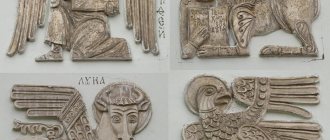14:1 Let not your heart be troubled; believe in God and believe in Me
It is clear that after talking about the betrayal of Christ, the disciples felt uncomfortable, so Jesus made them understand that their main task was not to weaken in faith, the rest just needed to be experienced.
14:2 In My Father's house there are many mansions.
That is, for everyone who comes to the Father of Christ, there is enough space in His house; none of those who come to Him will remain unaccepted. It is only important to come to the Father the right way in the footsteps of Christ.
But if it were not so, I would tell you: I am going to prepare a place for you
The disciples should have understood that Jesus was not leaving them for good and so that they would have the opportunity to one day get to the Father.
14:3 And when I go and prepare a place for you...
There is a close connection between the departure of Christ to heaven to the Father and the opportunity for the apostles to get to the same place where Christ will be, and this will not happen immediately after his departure.
I will come again and take you to Me, so that where I am you also may be.
Speaking about returning for the apostles, Jesus spoke about the time of the sounding of the last trumpet of God, when he will come for all who must rise from the dead and be gathered to him in heaven - 1 Thessalonians 4:16,17. This means that not a single Christian, dying before the second coming of Christ, immediately goes to Christ in the heavenly abodes of God (as some Bible scholars teach, speaking about the ascension to heaven after death). So, Christ shows that it is not the disciples who will come to Christ at heaven, and he himself will call them in due time.
14:4 And where I am going, you know, and you know the way.
But the main thing is that they now
know the path of life, the very path that will one day lead them to the abodes of God (heavenly)
14:5-9 It would seem that Jesus clearly explained the essence of things to them at that moment, but the disciples did not even understand his speeches now, just before his departure: Thomas still did not understand where Christ was going and why they turned out to know the way to the Father:
5 Lord! we don’t know where you’re going; and how can we know the way?
But Philip still did not understand that Jesus had ALREADY shown them his Father:
8,9
I have been with you for so long and you do not know Me, Philip?
Philip needed more time to understand something about the Father of Jesus.
From this conversation we see that everyone learns from Christ in different ways, some go to the “senior grades”, while others are located in the “junior grades”. That is why Christ pointed out to Philip the AMOUNT of time, so that he would realize its transience and more actively think about what was what, learning from Christ. 6 I am the way and the truth and the life;
no one comes to the Father except through Me. Jesus is the way to the Father, first of all, because through his sacrificial death he opened the “door” for humanity to reconciliation with the Father. Also because he paved for everyone the traces of the very path to God: he showed us all a true picture (the truth) of what we should do in order to come to the Father and be saved (live forever).
Not all paths, as we see, lead to God; there is only one path to Him - the path following the footsteps of Christ. Since Jesus himself goes to the Father, having walked his own path, it means that his example is the path to the Father in heaven. Any other way of life does not lead to Him. Just like other spiritual practices. As the Bible shows, although everyone has the same path to God, nevertheless, the speed of its passage is different for everyone: someone will walk the path of Christ in this century and reach the Father (participants in the first resurrection), and someone will only at the very end of the Millennium will be able to come to the Father and become His son (participants in the second resurrection) - Rev. 20:4,6, 7, 11-15, 21:3,4.
7:9 He who has seen Me has seen the Father;
Does Jesus mean by this that he and his Father are the same person? No. Jesus only says that he, being a son to his Father, essentially thinks the same way as his Father, acts in the same way as the Father would act in similar circumstances. Jesus knows very well the will of the Father and his own will is the same. And the more Christians succeed in acquiring the mind of Christ, the more likely they are to become one with God and Christ, so that one can say about them: “whoever has seen them is the same as having seen Christ and his Father.”
The Old Testament, through Moses, for the most part - in theory - spoke about God, about his intentions and laws, which must be fulfilled by all who consider themselves to be His people. And the New Testament, through Christ and his actions, as well as through the works and actions of the apostles, showed in practice what God’s people should be like in practice.
And you don't know me, Philip?
This conversation took place just before the arrest of Christ, and one can imagine the depth of his grief from complete loneliness and the absence of those who understand him on earth. However, the confidence that in due time everything that would be needed would be revealed helped him continue his path to the Father.
14:10 Do you not believe that I am in the Father and the Father in Me?
Jesus is not talking here about the literal presence of the Father in him - the omnipotent Spirit of the Almighty, squeezed into the body of the man Jesus. And vice versa.
Jesus speaks here of complete spiritual unity with the Father, for only God's spiritual principle makes a person conform to the image of God.
The words that I speak to you, I do not speak from Myself; The Father abiding in Me, He does the works.
Jesus patiently explains again and again, while he still has time, what his unity with the Father means and how it is possible to calculate the Father from it: delving into the essence of the word transmitted from the Father, exploring the great works of Christ, created with the help of the Father, feeling the way of life of Jesus - it is possible to feel something about the Father. To know God does not mean to acquire only intellectual knowledge about Him. But it means experiencing the essence of the Father on yourself, acting as He acts.
Jesus showed everyone how his Father acts. If we act like Jesus, then we have a chance to know the Father through knowing Christ. There is no other way to know God through Christ except through the habit of the path of Christ. But there is something else, without which it is impossible to know either Christ or God:
14:11 Believe Me that I am in the Father and the Father in Me;
The fact that Jesus Christ represents his heavenly Father and our God on earth must be believed. Without faith in the need to accept Christ as a savior and follow in his footsteps to the Father, you cannot get to God.
But Jesus understands that mortal man needs strong reasons for faith: you never know who calls himself who and who invites him where. Therefore, he again tells the disciples how it is possible to believe that he is the Christ of God:
but if not so, then believe Me by the very works
. That is, if it is difficult for them to take Christ at his word, then the super-miraculous manifestations of the works that Jesus presented to the disciples during his ministry to God on earth speak louder than words.
14:12 Truly, truly, I say to you, he who believes in Me, the works that I do, he will do also.
It is possible to master the path of Christ (his works) provided that one believes that this is the only path in life that has meaning and leads to salvation. With this approach, you can master and reproduce everything that the man Jesus Christ did on earth and endure the same thing that he endured on the way to the Father. (does not mean the phenomena of supernatural healing and resurrection, performed with the direct participation of God to confirm that Jesus is the Christ of God)
and he will do greater things than these, because I go to My Father.
In what sense is it greater and what is the connection between the great deeds of the disciples and the fact that Jesus goes to the Father? More - not in the sense of quality (no one can contain more of the holy spirit than Christ had), but in the sense of quantity: the disciples had to show the path of Christ not only to Judea and Samaria, but also to the ends of the earth. And - throughout his entire life, and not just 3.5 years, as happened to Christ.
Why will this be possible for the disciples of Christ? Because Jesus will become their faithful spiritual assistant from above until the end of this wicked age. And help from above in the form of the holy spirit is much more powerful than just physical help within the earth.
14:13,14 And if you ask the Father for anything in My name
As we see, a Christian should direct his prayers and petitions, which are related to walking the path of Christ on earth and fulfilling God’s will (in the name of Christ), to the Father of Christ.
I will do this, that the Father may be glorified in the Son.
Christ is authorized to fulfill the requests of his followers, so that everyone understands the absolute unity between the Father and His son: if they asked God, and received through Christ, it means that the Father and the son are faithful companions to each other, through the help of Christ, the Father who gave it to the son is glorified OPPORTUNITY to help Christians upon their prayer request.
If Christians call Father the one whom Jesus Christ calls Father, then it means that they must do everything in such a way that the Father is glorified in them as in His sons.
Let us note that using the name of Jesus Christ when addressing God does not guarantee that any request will automatically be fulfilled: the name of Jesus does not have any magical power and does not carry any magical formula. To pray in the name of Christ is to be so imbued with the purposes and Spirit of Christ that our request is completely identified with the will of God and its fulfillment will help God's work (1 John 5:14).
14:15,16 If you love Me, keep My commandments.
There is one way to prove your love for God and His Christ - this is to translate it into the WORK of doing the will of God on earth. Jesus showed the disciples that on this path they are not alone, both the Father and the Son stand behind them, and they will be helped from heaven to make this path through their prayer and request. The only thing they will need to do THEMSELVES is not to grow cold in love for Christ and to observe every single one of his instructions. For the rest, they will definitely receive help from above:
And I will ask the Father, and he will give you another Comforter, that he may be with you forever,
14:17,18 the Spirit of truth,...you know Him, for He abides with you and will be in you.
The Spirit of truth or righteousness from God, which at present abided with Christ, after his ascension into heaven, will abide with his disciples. This is God’s intention for help from above, so that Christ’s disciples have a superhuman ability to discern where the truth of God is and where it is a lie, where the holy spirit is and where the unclean spirit is. This is exactly how, through communion with the holy spirit at Pentecost in a supernatural way, Christ’s help to his disciples on earth will be manifested:
I will not leave you orphans;
I'll come to you. One who has “tasted” the spirit of God, the truth of God, His inner essence, His attitude towards everything, will have the opportunity to act AS God expects, according to His truth, and not according to the model of the spirit of this world, to which the way of life of God’s man is incomprehensible : The world cannot receive
(the spirit of God's truth)
because it does not see Him and does not know Him;
And when a Christian receives a gift from above, the inner worldview and understanding of God through the Holy Spirit is a huge help for a Christian. It in itself rejects what is alien, not God’s; a Christian cannot consciously cling to uncleanness in the same way as, for example, a butterfly cannot cling to a garbage dump. But not because she is much better than a garbage dump, but because internally it is unnatural for her. God's spirit abiding in a Christian makes it easier for him to resist sin.
Today, Christians can receive the spirit of the truth of God through reading and studying the word of God, the Bible, but this is not only the spirit of intellectual knowledge about God and His Christ, about His laws and the history of mankind. It is also the spirit of love, justice, mercy, meekness, long-suffering of God, which can be seen, felt, understood, accepted for oneself and into oneself through Scripture and meditation on it. Many read the Bible and gain knowledge of God through it, but not many come to know God by receiving the Spirit of God hidden in it.
14:19,20 the world will see Me no more; and you will see Me, for I live, and you will live.
Jesus predicts here his resurrection and meeting with his disciples after the resurrection, which the world will not believe.
On that day you will know that I am in My Father, and you in Me, and I in you.
The disciples could hardly understand Christ now, but he predicted to them everything that was to happen in the near future, so that they would understand his words at least at the moment when certain events took place: a meeting with him after the resurrection and the anointing with the holy spirit at Pentecost.
14:21
He who has My commandments and keeps them, it is he who loves Me;
and whoever loves Me will be loved by My Father; Love is greater than a sense of duty. But love in words is not enough. It must manifest itself in practice. If there are no Christian deeds, if the commandments of Christ written in the Bible are not fulfilled by Christians, it means that they do not love Christ, which means that their expectations for salvation are in vain.
and I will love him and appear to him Myself.
Jesus himself decides who, when and in what manifestation to appear, calling his disciple to carry out some work of God. As, for example, happened with the Apostle Paul and the Apostle John. But an indispensable condition for the revelation of Christ to someone is his fulfillment of the commandments of Christ, driven by love for God, for Christ and for a righteous way of life.
14:22-25
Lord!
What is it that You want to reveal Yourself to us and not to the world? Judas (not a traitor) sincerely does not understand, if the whole world should know about the Christ of God, then why is Jesus so selective and unwilling to reveal himself to the world?
whoever loves Me will keep My word;
and My Father will love him, and We will come to him and make our abode with him. He who does not love Me does not keep My words;
Jesus explains that not everyone in the world is favored by His Father. Reluctance to keep the commandments of Christ - this in itself will push the Father away from many. The Father ultimately decides on whom to fix His gaze and to whom to reveal Himself through Christ: those who very much desire to see and understand the Father, who can look at everything through His eyes, will see Him through the son and in the son. And for those who do not want to see and understand Him, there is no point in showing themselves.
The son and the Father can afford to create a “abode” for their “stay” only with someone who is able to accommodate and appreciate this spiritual community, not with everyone. (therefore, the process of election and calling will take place over many centuries)
The word that you hear is not Mine, but the Father who sent Me.
Jesus explains where the Father comes from with such a requirement for people that they must necessarily keep the word of Christ: in fact, the word of Christ is the word of his Father, God. Christ simply brought the word of God to the earth exactly.
14:26 But the Comforter, the Holy Spirit, whom the Father will send in My name, will teach you everything and remind you of everything that I have told you.
The Holy Spirit, sent to help those who go to God, just as Christ walked (
in my name
), will become a guarantee that the Father has decided to create “His spiritual abode” here, in this person. The Holy Spirit will become for Christians not only a consolation and helper on the path of Christ, but will also provide all the necessary knowledge for this path from above - 1 John 2:20,27
The disciples of Christ, for example, with the help of the holy spirit, many years after communicating with Christ on earth, were able to remember everything that was required to write the Gospels. And the Apostle Paul, for example, with the help of the holy spirit was able to provide Christian congregations with truthful explanations of many obscure passages of the Old Testament, testifying to God's plan for Christ and the acceptance of the pagans.
14:27 Peace I leave with you, My peace I give to you; not as the world gives, I give to you.
Jesus showed them HIS inner world or God’s worldview and worldview. They are different from what a godless world can give someone. Those who do not love God have completely different ideas about the meaning of life and ways of living it.
Let not your heart be troubled, neither let it be afraid.
Jesus also asks the disciples not to panic about the upcoming events, for he will soon go to the Father in heaven, and they will have to get used to living only by faith in him, but without his visible presence. It is not easy.
14:28,29 If you loved Me, you would rejoice that I said: I am going to the Father;
Why are these disciples, IF they loved him, they would rejoice at the message “I am going to the Father,” and would not be afraid of the departure of Christ and further life without him?
Because: My Father is greater than Me.
That is, Christ’s departure to the Father would mean that Jesus successfully completed the task of his Father, who, being “more than a son,” had the authority to send him to earth and receive him back after completing the “operation” to save humanity. The disciples would rejoice that Jesus remained faithful to his Father, that he would remain alive, and even though he would not be with them on earth, and even if they would feel bad without him, but he is alive, and this is the main joy for those who love Christ.
Plus, the fact that the Father is greater than the son means that the Father has more powers, abilities and opportunities from above to help them all AFTER Christ, raised to life, begins to intercede about this before Him in heaven. And this is also a considerable reason for joy.
I told you before it happened, so that you might believe when it happens.
A very important point. TRUSTING Christ is necessary BEFORE the fulfillment of the predicted prophecy or future events. To expect its fulfillment and to recognize it when it is fulfilled.
14:30,31 The prince of this world comes and has nothing in Me.
The devil, acting through Judas Iscariot, was approaching the fulfillment of his plan to destroy God's son. However, the prince of this world did not have a single dark spot in Christ that he could cling to and drag Christ down to his feet for worship. In this age he is allowed to be the master of the situation and have the power to destroy those who will not bow to him under any circumstances. In this age there is death for both the righteous and the sinful - Eccl. 9:2. But you can die without being thrown under the feet of the devil - in worship of him. And to do this, we must manage not to give it room to take hold in us.
We must try hard: Jesus washes us in many ways with his blood, but even after being washed, we will still have to try every day, and even until death. To prevent the devil from clinging to them. ( see discussion of John 13:6-10 on the meaning of washing feet
)
But so that the world may know that I love the Father and, as the Father commanded Me, so I do: get up, let’s go from here.
Jesus knew that he was going to destruction, but his Father entrusted him with such a mission, and for the sake of love for the Father, he was ready to die, fulfilling His will for the salvation of mankind.
Text [edit]
The original text was written in Koine Greek. This chapter is divided into 31 verses.
Textual evidence[edit]
Some early manuscripts containing the text of this chapter:
- Papyrus 75 (175-225 AD)
- Papyrus 66 (~200).
- Vatican Code (325–350)
- Codex Sinaiticus (330–360)
- Codex Bezae (~400)
- Codex Alexandrinus (400-440)
- Codex Ephraemi Rescriptus (~450; extant verses 1-7))
End of chapter (14:28–31)[edit]
As the chapter comes to a close (verses 28–31), Jesus reiterates that He is leaving but will return.
This passage concludes Jesus' conversation with his closest disciples: I will not talk to you much anymore
(John 14:30a)
for His life is now directed solely to the task of obedience to His Father (John 14:31a-c).
Preparing to leave the upper room, He says to His disciples:
Arise, let us go from here
(John 14:31d). [28]
Their departure is logically connected to the opening words of chapter 18: When Jesus had spoken these words, He went out with His disciples by the brook Kidron, where there was a garden into which He and His disciples entered
. This connection has led some commentators to believe that chapters 15–17 represent Jesus' conversation "as they advanced on the way to the Mount of Olives", [29] or "that they rise from the table and prepare to leave, but the contents of the next three chapters are spoken before leaving the room." [30] In Mark 14:42 and Matthew 26:46 the same words "rise, let us go" (Greek: εγειρεσθε αγωμεν) appear in the Gethsemane narrative set later in these gospels describing the passion of Jesus. [28]
Prayer[edit]
Further information: Christian prayer
Verse 13 reads:
If you ask [me] anything in My name, I will do it, that the Father may be glorified in the Son,
and verse 14 partially repeats this:
If you ask [me] anything in My name, I will do it
.
The Byzantine monk and biblical commentator Euthymius Zigabenos states that "the promise is repeated... for confirmation". [25] Buls notes that both verses (13 and 14) "clearly imply that believers will have many needs" and that Jesus' commitment to do what is asked of him and requested on his behalf "leads to—and has its the goal is the Father’s robe in splendor.” [26]
Links[edit]
- ↑
Halley,
Henry H.
Halley
's Bible Handbook : An Abridged Bible Commentary. 23rd edition. Zondervan Publishing 1962 - Holman Bible Handbook Illustrated. Holman Bible Publishers, Nashville, Tennessee. 2012
- Ellicott's Commentary for Modern Readers on John 14, accessed July 1, 2016
- ^ ab Benguela Gnomon on 14 John, accessed July 1, 2016.
- ↑
John 14:1 - Schaff, P. (ed.), St. Augustine's Sermons or Treatises on the Gospel of John, Treatise LXVII, Nicene and Post-Nicene Fathers in the Christian Classical Ether Library
- ↑
Meyer, H., NT Commentary Meyer on John 14, accessed May 31, 2022. - Augustine, Sermons on the Gospel of John, Tract 67, accessed July 7, 2016
- ↑
Thomas Aquinas, Summa Theologica, question 93. The happiness of the saints and their abodes, accessed July 7, 2016. - Ellicott's Commentary for Modern Readers on John 14, accessed July 1, 2016
- Wed Matthew 28:20: "I am with you always, even to the end of the ages"
- Ellicott's Commentary for Modern Readers on John 14, accessed July 1, 2016
- Cambridge School and College Bible 14 John, accessed 5 July 2016; Wed Acts 1:6
- ↑
John 14:6 NKJV - ↑
John 14:7 NKJV - Strong's Concordance 1097: ginóskó
- Strong's Concordance 1492: Eido
- ↑
See, for example, Westcott-Hort's text from John 14. - Byzantine text, John 14
- ^ ab Ellicott's Commentary for Modern Readers on John 14, accessed July 1, 2016.
- Cage Commentary from John 14, accessed July 7, 2016
- ↑
John 1:43 - ↑
Cambridge Bible for Schools and Colleges, 14 John, accessed 5 July 2016. - BULS' Notes on John 14:1-12, accessed July 9, 2016
- ↑
Quoted in Expositor's Greek Testament on 14 John, accessed July 10, 2016. - BULS' Notes on John 14:31-21, accessed June 1, 2019
- John 14:26
- ^ab Bevan, H.B.H., "Is there any meaning in the saying, 'Arise, let us go hence' (John 14:31d)?" , Journal of Theological Studies
, new series, vol. 54, no. 2 (October 2003), pp. 576-584 - Matthew Pulpit Commentary on John 14, accessed July 11, 2016, Wed Pulpit Commentary on John 14, accessed July 7, 2016.
- ↑
Cambridge Bible for Schools and Colleges, 14 John, accessed 5 July 2016.





